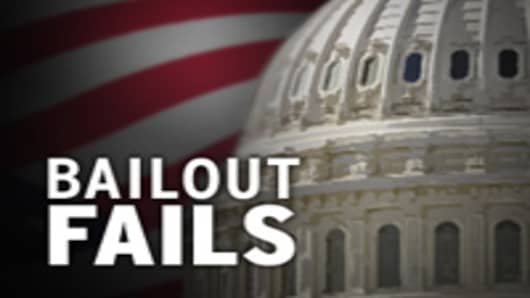Democratic and Republican leaders pledged to try and hammer out a revised financial bailout proposal, but it was unclear how much support any new plan would get.
Congressional staffers told CNBC that there wouldn't be any votes on a new bailout proposal until Thursday at the earliest.
After the House's surprise rejection of the $700 billion bailout bill on Monday, U.S. Treasury Secretary Henry Paulson said he was "very disappointed" but pledged to continue working with Congress to forge a rescue.
"I will continue to work with Congressional leaders to find a forward to pass a comprehensive plan to stabilize our financial system and protect the American people by limiting the prospects of further deterioration in our economy," Paulson said. "We've got much work to do, and this is much too important to simply let fail."
Citing recent bank failures in the United States and Europe, Paulson said regulators and legislators need to act "as soon as possible" to ensure the health of credit markets that U.S. businesses depend on to meet payrolls and purchase inventory.
More From CNBC.com
House of Representatives Speaker Nancy Pelosi said she was prepared to work in a bipartisan way with Republicans to get financial bailout legislation approved.
Pelosi, a Democrat, also told reporters she spoke to Paulson soon after the $700 billion bill to jump-start stalled capital markets was rejected by the House in a vote of 228-205.
Stocks plunged on Wall Street even before the vote to reject the bill was announced on the House floor. The Dow Jones Industrial Average closed down 777 points.
The failure of the bailout bill—after more than a week of intensive closed-door negotiation intended to hammer out a compromise plan—brought new uncertainty about the response of the government to the worst financial crisis since the Great Depression.
President Bush was set to huddle with economic advisers to consider the administration's next move after the White House failed to win support for the bailout plan from Bush's fellow Republicans.
"There's no question the economy is facing a difficult crisis that needs to be addressed,'' White House spokesman Tony Fratto told reporters.
The bailout plan was announced by the Bush administration last week. In the end, Republican House members voted against it by a more than 2-to-1 margin. A majority of Democrats voted in favor.
Rep. Barney Frank, a Massachusetts Democrat who helped craft the bill in hours of negotiations with leading lawmakers, said the next step could hinge on the economic fallout from the bill's failure.
Capping three hours of debate, House Majority Leader Steny Hoyer of Maryland had warned lawmakers that the cost of inaction would be an economic calamity beyond Wall Street.
"A meltdown would begin, it is true, on a few square miles of Manhattan, but before it was over, all of us know, no city or town in America would be untouched,'' Hoyer said.
Bush and a host of leading congressional figures had implored the lawmakers to pass the legislation despite howls of protest from their constituents back home.
The vote had been preceded by unusually aggressive White House lobbying, and spokesman Tony Fratto said that Bush had used a "call list" of people he wanted to persuade to vote yes as late as just a short time before the vote.
Lawmakers shouted news of the plummeting Dow Jones average as lawmakers crowded on the House floor during the drawn-out and tense call of the roll, which dragged on for roughly 40 minutes as leaders on both sides scrambled to corral enough of their rank-and-file members to support the deeply unpopular measure.
They found only two.
Bush and his economic advisers, as well as congressional leaders in both parties had argued the plan was vital to insulating ordinary Americans from the effects of Wall Street's bad bets.
The version that was up for vote Monday was the product of marathon closed-door negotiations on Capitol Hill over the weekend.
"We're all worried about losing our jobs," Rep. Paul Ryan, R-Wis., declared in an impassioned speech in support of the bill before the vote. "Most of us say, 'I want this thing to pass, but I want you to vote for it—not me.' "
With their dire warnings of impending economic doom and their sweeping request for unprecedented sums of money and authority to bail out cash-starved financial firms, Bush and his economic chiefs have focused the attention of world markets on Congress, Ryan added.
"We're in this moment, and if we fail to do the right thing, Heaven help us," he said.


